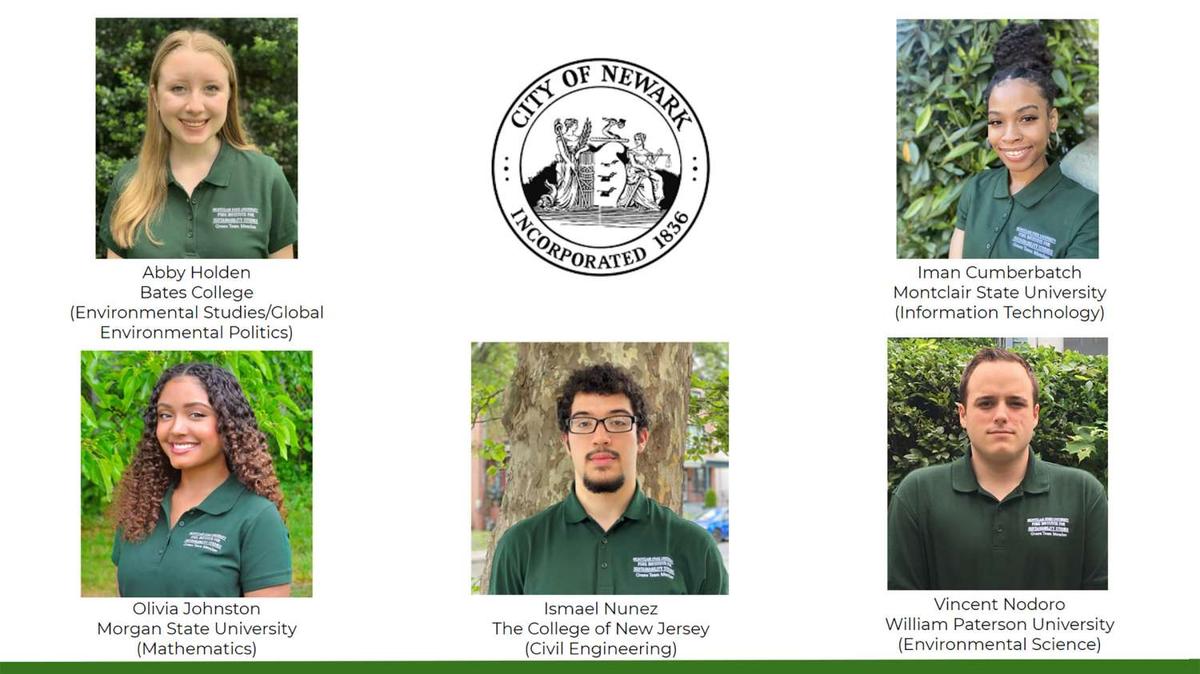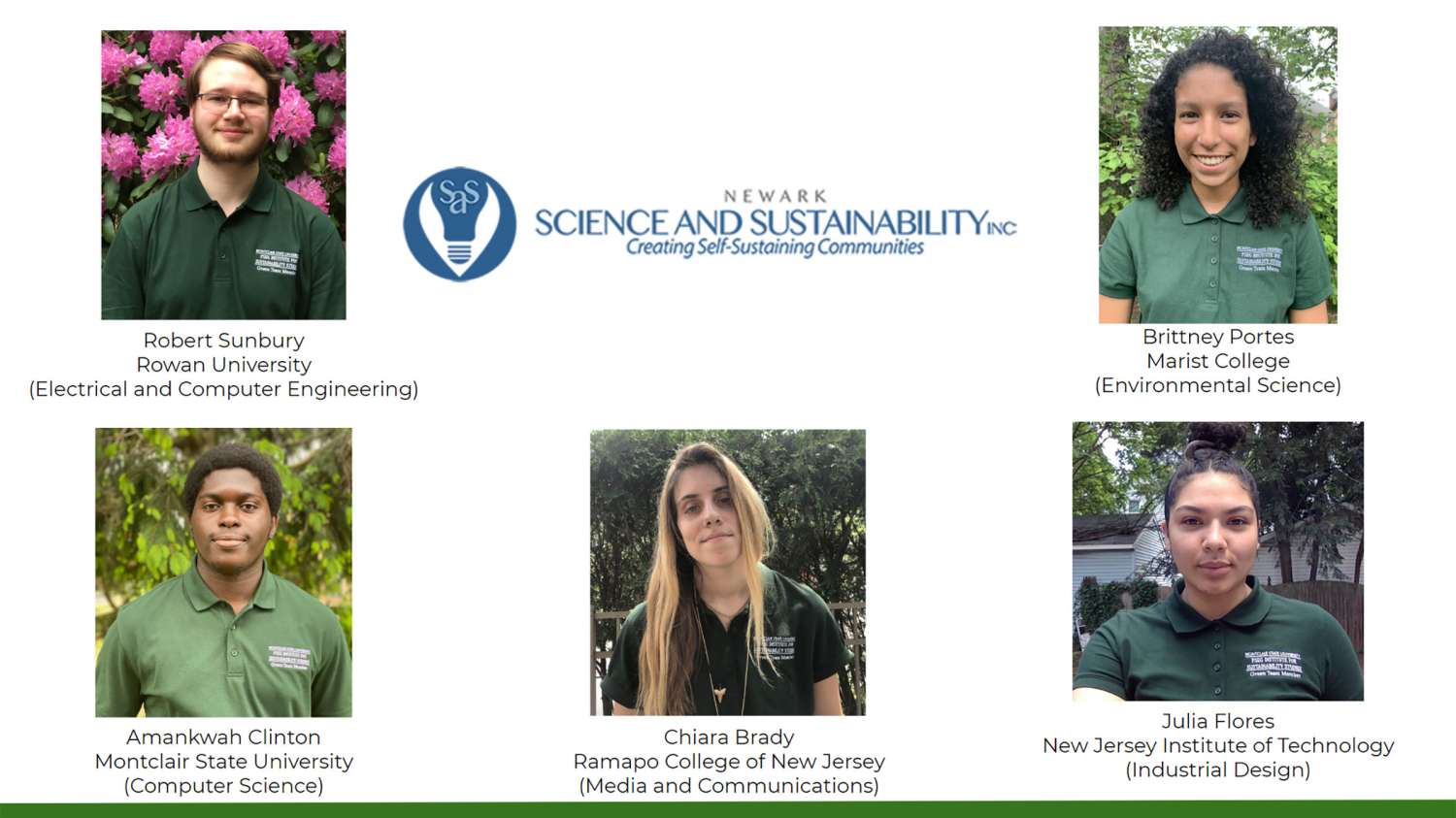
Community gardens where there used to be vacant lots, legislation that regulates greenhouse gas emissions, and more energy efficient power companies. Three groups of college students have dedicated their summer to bringing these visions to life in Newark.
The Montclair State University PSEG Institute for Sustainability Studies has just wrapped up their 2020 Green Teams program.
Six teams of five students from universities across the tri-state area have been tasked with solving sustainability related issues for organizations in New Jersey. They worked full-time hours throughout the summer and received support from the Montclair PSEG ISS, both in terms of financial compensation as well as seminars and tutorials for the skills they needed to accomplish their goals.
“We teach them about systems thinking and project management, corporate social responsibility as well as information about small businesses and government organizations.”
That’s Amy Tuninga, the Director of the Montclair State PSEG ISS.
“We also talk with them about culture. Some of it’s corporate culture, some of it’s the culture of the community that that organization exists in. We also offer leadership certificates through the program and a lot of professional development training.”
This year, the teams have worked with Public Service Enterprise Group or PSEG, New Jersey Natural Gas, The City of Newark, The City of Jersey City, The Northern New Jersey Community Foundation, and Newark Science and Sustainability. I got to speak to the three teams who will be spending time in Newark.
“My name is Olivia Johnston, I’m a mathematics major at Morgan State University. I really am passionate about environmental justice and things like that. If we have a sustainable solution for a lot of the problems that affect our world right now, less fortunate communities will have better solutions in the future and better living conditions.”
Johnston’s team has created a summary of the greenhouse gases that the City of Newark emits, and developed an action plan based on their findings. She hopes that her team’s work may lead to some legislation regulating emissions, and hopes that other cities follow suit. She says that like any form of activism, making a global impact depends on individuals doing the work in their own cities first.
“It’s hard to do it on a worldwide scale if you don’t hone in on your city and where you’re from.”
Johnston, like all of the other students I spoke with had more than one job prospect lined up for the summer. But once she was accepted into the Green Teams program, the decision to decline her other offer was not a difficult one.
“The other internship that I got offered was for commercial banking. Yeah, it sounded cool but I don’t think that’s something I could be passionate about. I wanted to do something where I actually feel like I was making a positive difference.”
Since the program’s inception in 2016 and not including this year, 180 undergraduates from 26 universities and over 60 different degree programs have completed a total of 128 projects. These projects are specific to every organization, and are always complex. These students are surveying emissions, making energy reduction projections, and putting together action plans for organizations as large as NJ Transit, Bristol-Myers Squibb, and ADP to name a few.

I spoke with the team who spent the summer with PSEG, which supplies power to 70% of New Jersey and is headquartered in Newark.
“My name is Chikwendu Nwachuku, my major is electrical engineering and I’m concentrating in power, and currently I’m a senior at New Jersey Institute of Technology.”
Nwanchuku’s team was tasked with advancing PSEG’s internal energy reduction effort. They gathered data about the company’s electricity consumption, analyzed the most efficient ways to reduce consumption, and developed a communications plan for distributing the information to employees. It’s a large undertaking but Nwachuku says that the program strikes the perfect balance between challenging them.
“When the responsibility lies on you then the challenge and the quest for innovation comes into play so most times people see in you what you don’t see in yourself and sometimes pressure forces and molds you into shape.”
And balancing the challenge with heavy support in the form of information, software, training, and more.
Chikwendu Nwachuku said, “Every day you get new information that you never had or you never knew was there. So that’s the highlight for me, I keep learning every day something new.”
Maya Shah, also from team PSEG, echoes that sentiment.
“It’s definitely intimidating because when I look at the big picture I’m just a 19-year-old who is having her first internship for the largest utility in New Jersey so it just doesn’t really click with me – how am I doing this? But then at the same time I realize that I have a lot of support. It’s not like we’re just thrown into the deep water and told to figure it out ourselves. It’s really nice to have that flexibility and for people to trust our ideas.”

Another aspect prominently built into the program is diversity. Each team has several members who are not studying environmental sustainability or anything even related to it, including Shah who is studying psychology and mathematics.
Maya Shah said, “I think the biggest thing for me was learning that the information that I already knew was still applicable to this topic. Because I walked in here and I heard from everybody else how they had done research, how they had taken classes, how their majors were specifically related to environmental sustainability and I haven’t taken a single environmental sustainability class. I know essentially nothing compared to these people. I was very nervous walking into it and I thought that I wouldn’t be able to contribute as much as I wanted to but then realizing that I had these types of backgrounds that I could apply to it and all I needed to do was ask questions and I was learning a lot from it, was a big thing for me.”
As an environmental science major, Britney Portes also appreciates having people like Shah around.
“For me, I was really excited with the opportunity to work in a team that wasn’t just environmental students. I think that’s something that especially in the environmental science field I found myself always being around the same types of people.”
Portes is on team NJ Science and Sustainability, and takes pride in her team’s diversity.
“One’s an IT major, one’s a comp-sci major, another one’s a film major and I’m just not exposed to other types of majors and it’s pretty cool that I get to collaborate with different types of thinkers.”
NJ Science and Sustainability’s mission is to combine sustainability with social entrepreneurship to improve the culture of health in Newark. Portes’ team will be assisting in developing the plot of land they acquired through the city’s Adopt-a-Lot program.
In addition to the wealth of support on Montclair’s part, the students also described host organizations who fully believe in their ability to complete these projects. In Portes’ case, she is thrilled with the leadership of Tobias Fox, the founder and managing director at NJ SAS.
“Tobias, he’s always like ‘What you guys think is best.’ It’s really important I think that he has so much trust in us and because of that we have trust in each other as a group that whatever we want to implement will be one of the best solutions for the most efficient type of garden and outcome.”
Fox, in turn, is thrilled with the team that is working with him, and the program as a whole.
“I’m excited about this collaboration with the green teams. This is our second year working with the green teams. It’s great having these young minds from different walks of life, different disciplines, different backgrounds come together for a common cause. I see the opportunity of us really creating some sustainable serious lifelong changes in our society.”
One of those changes Portes hopes to see is a greater effort from people of all walks of life to take sustainability more seriously.
“This issue is prevalent across every single discipline and I think it’s important for people of all generations, all backgrounds to realize this affects everyone. And anyone in any discipline can be making efforts towards sustainability.”
This story was produced in collaboration with CivicStory and the New Jersey Sustainability Reporting Hub project. It was originally reported by Stephanie Avila for WBGO, and may be re-distributed through theCreative Commons License, with attribution.
